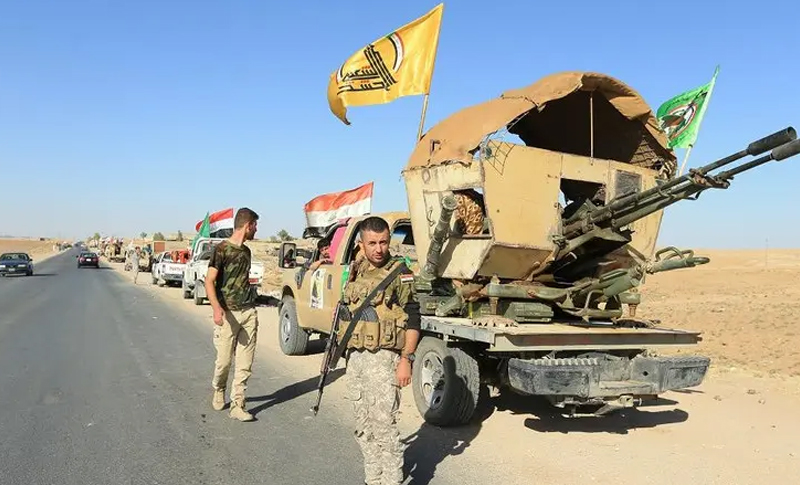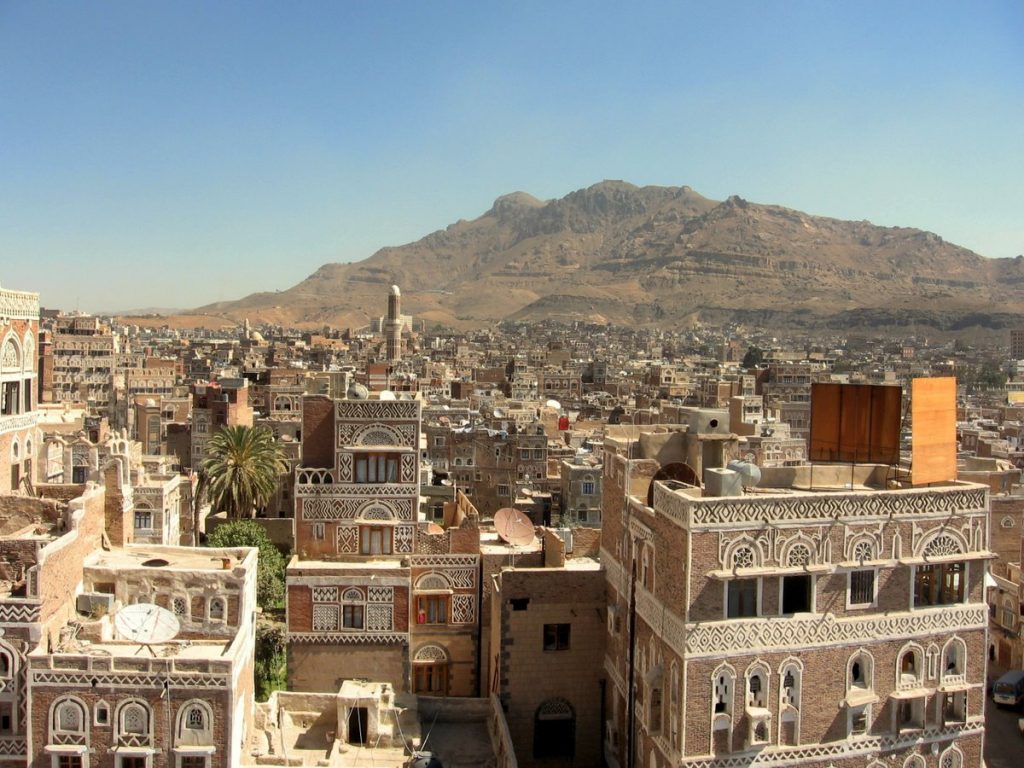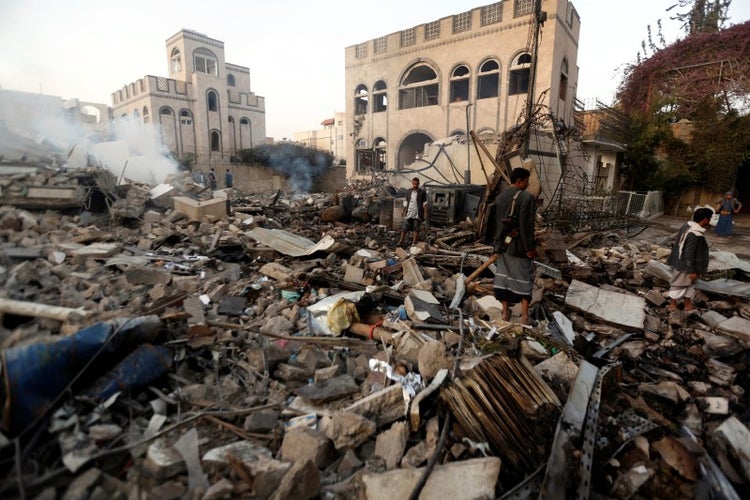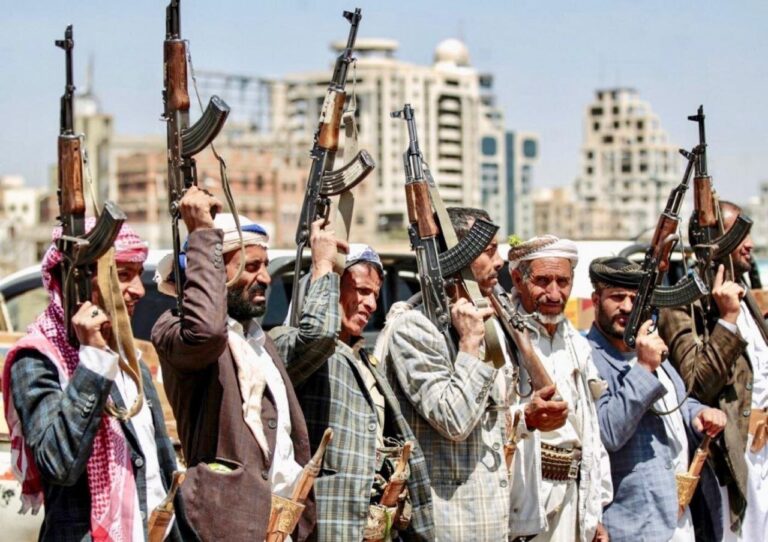Since the 7 October Hamas attack on Israel, the Houthi movement (Ansar Allah, or ‘Partisans of God’) has emerged as one of the most active and capable members of Iran’s so-called ‘Axis of Resistance’ – an alliance built over years of Iranian support to counter Israeli and US influence in the Middle East.
Over the past year, the Yemeni group has intensified threats to global naval trade by attacking commercial shipping in the Red Sea and Bab el-Mandeb while defying US-led efforts to neutralise its arsenal.
Despite growing ties with Tehran and alignment with other members of the Axis, the Houthis remain the most autonomous entity in Iran’s network. They have distinct regional ambitions, forging new partnerships beyond the Middle East.
Since the 7 October Hamas attack on Israel, the Houthi movement (Ansar Allah, or ‘Partisans of God’) has emerged as one of the most active and capable members of Iran’s so-called ‘Axis of Resistance’ – an alliance built over years of Iranian support to counter Israeli and US influence in the Middle East.
Thanks to the threat they pose to navigation shipping routes, the Houthis’ rising prominence has attracted international actors, including Russia, seeking to challenge the Western-dominated political and economic order. Moscow’s ties with the Yemeni group have grown alongside its military partnership with Iran and its Axis.
The Houthis’ rising contacts with Russia underline how the Yemeni group is working to diversify its alliances, also beyond Iranian-led ‘Resistance,. “From the Houthis’ perspective, Russia fits into this scheme to acquire new partners for weapons, smuggling routes, and finances.
While Moscow officially maintains a neutral stance in Yemen’s conflict, its interactions with the Houthis have grown significantly, especially since the outbreak of the Gaza war in the context of Ansar Allah’s strategic operations in the Red Sea. In 2024, Houthi delegations visited Moscow twice to meet Deputy Foreign Minister Mikhail Bogdanov, with additional meetings in Oman last July.
US intelligence reported that Russia deployed GRU military advisors to Houthi-controlled regions in Yemen. These are believed to have been operating in the country for months, providing weaponry training, identifying commercial targets for anti-Western operations, and potentially supplying tracking data to enhance the Houthis’ ability to attack commercial vessels.
The GRU is known for conducting covert operations to advance Russian geopolitical objectives. Supporting the Houthis covertly would allow Moscow to project influence in Yemen without overtly antagonizing Saudi Arabia or other Gulf states.
Indirect Support: If the GRU were involved, its activities would likely be indirect, such as facilitating arms transfers, intelligence sharing, or operational training, possibly through intermediaries like Iran or other regional actors.
As Russia seeks to retaliate for the US permitting the use of long-range missiles by Ukraine against it, assisting the Houthis in keeping the US snarled up militarily and financially in the Red Sea may well seem like an attractive option.
Russia’s engagement with the Houthis, a significant faction in Yemen’s civil war, serves several strategic, geopolitical, and economic purposes. While Russia has historically maintained a relatively balanced approach in the Yemen conflict, its relationship with the Houthis aligns with broader objectives in the Middle East. Here’s why Russia might see value in fostering ties with the Houthis:
1. Geopolitical Influence in the Middle East
- Expanding Influence: Aligning with the Houthis gives Russia an opportunity to extend its reach into the Arabian Peninsula, a region traditionally dominated by U.S. allies like Saudi Arabia.
- Countering Western Hegemony: Supporting the Houthis can act as a counterweight to Western-aligned coalitions, particularly those led by the U.S. and Saudi Arabia.
2. Maritime and Strategic Interests
- Control of Strategic Chokepoints: The Houthis control areas near the Bab-el-Mandeb Strait, a vital maritime passage for global trade. Establishing influence over this chokepoint strengthens Russia’s ability to project power in the Red Sea and Indian Ocean.
- Naval Presence: Russia may seek naval access or logistical agreements in Houthi-controlled areas, complementing its presence in Syria’s Tartus port and enhancing its global maritime strategy.
3. Balancing Regional Relationships
- Saudi Arabia and Iran:
- Russia has cultivated ties with both Saudi Arabia and Iran, the latter being a key backer of the Houthis. Engaging with the Houthis allows Russia to maintain a delicate balance between these two powers.
- By playing a mediating role, Russia positions itself as a key power broker in the region.
The Houthis are heavily supported by Iran, a key Russian ally in the region. The GRU might coordinate indirectly with the Houthis through Iran’s Revolutionary Guard Corps (IRGC), especially if this serves broader Russian-Iranian objectives.
The GRU could theoretically play a role in facilitating covert arms shipments to the Houthis, either directly or via intermediaries.
Specialized Training: GRU personnel are known for their expertise in guerrilla and asymmetrical warfare. If a connection exists, it might involve providing strategic advice or training to enhance the Houthis’ combat effectiveness.

More on this story: Iranian IRGC deployed in Yemen to support Houthis
Intelligence Sharing

More on this story: Regional powers influence on the ongoing war in Yemen
- Targeting and Surveillance: The Houthis have carried out sophisticated missile and drone attacks, some of which target Saudi oil infrastructure. GRU expertise in cyber and signals intelligence could theoretically be shared to enhance these capabilities.
4. Arms Sales and Economic Interests
- Weapons Market: The Houthis have relied heavily on arms, and while much of their arsenal comes from Iran, Russia could potentially see opportunities for covert arms sales or military partnerships.
- Post-War Reconstruction: If the Houthis maintain control in a post-conflict Yemen, Russia could leverage its relationship to secure economic contracts and reconstruction projects.
5. Undermining U.S. and Saudi Influence
- Destabilizing Rivals: Supporting the Houthis indirectly strains U.S. and Saudi resources, complicating their policies in Yemen and the broader region.
- Diplomatic Leverage: Russia’s involvement gives it a voice in Yemen-related negotiations, potentially allowing it to extract concessions in unrelated geopolitical matters.
6. Ideological Flexibility
- Unlike the U.S. or some regional powers, Russia does not adhere to rigid ideological frameworks in foreign policy. This pragmatism allows it to engage with diverse actors, including the Houthis, as long as it aligns with its strategic interests.
Russia’s relationship with the Houthis is less about ideological alignment and more about strategic utility. By engaging with the Houthis, Moscow can expand its influence in the Middle East, challenge Western dominance, secure maritime access, and position itself as a key mediator in one of the region’s most intractable conflicts. This pragmatic approach enhances Russia’s status as a global powerbroker while advancing its interests in the Red Sea and beyond.
A potentially escalating threat
Reports suggest Moscow has considered supplying the Houthis with small arms like AK-74s and advanced anti-ship cruise missiles (ASCM) P-800 Yakhont/Oniks.
These developments highlight a deepening Russia-Houthi collaboration, potentially escalating regional tensions and threatening international maritime trade. Any Russian transfer of weapons or intelligence to the Houthis would be a significant escalation.
Moscow seems to have refrained from such transfers, likely due to pressure from Saudi Arabia, but nonetheless raising alarm in the United States.
Additionally, allegations have surfaced that Houthi recruits have been trafficked into fighting in Ukraine under false promises of lucrative jobs and eventual Russian citizenship. Although such claims align with Moscow’s broader efforts to mitigate heavy losses in its ongoing war with Kyiv by enlisting migrants and foreign nationals – mainly North Koreans – they are still unverified, warranting caution.
For the Houthis, closer ties with Moscow will bring international recognition and new sources of military and intelligence support beyond Iran’s capabilities while further boosting their regional standing. This growing relationship also reflects shifts within the Axis of Resistance itself.
Ansar Allah, though geographically far from Israel, has assumed a larger role in the Axis by targeting international shipping and pressuring Israel during the Gaza war, but also because of their expanding arsenals and growing offensive capabilities.
In contrast, Hamas and Hezbollah have weakened amidst ongoing confrontation with Israel. “The Houthis aspire to take on a greater leadership role within – and beyond – the Axis of Resistance. Working with Russia provides status and recognition, not just weapons and data.
This partnership with Moscow complements Iran’s objectives, reinforcing shared anti-Western sentiment without undermining Houthi-Iran ties. The Houthis’ diversification of alliances is unlikely to create friction with Iran, particularly given the strengthening Iran-Russia defence partnership,.
Beyond its anti-Western dimension, Moscow’s involvement in Yemen could also serve as a strategic effort to gain leverage over Saudi Arabia. With Riyadh negotiating a potential defence treaty with the United States, Russia may be positioning itself as a spoiler, especially in anticipation of an incoming second Trump administration, where the Kingdom might adopt a more pro-American stance on oil prices in exchange for security guarantees.
Washington could pressure Saudi Arabia to use its influence with Moscow to block weapons and intelligence transfers to the Houthis. However, Trump’s focus will likely centre on curbing Riyadh’s growing ties to Russia (and China).
Riyadh risks losing the most from any escalation in the area, making it a critical player balancing tensions around the Houthis and Russia.
As the Houthis’ regional ambitions grow, disentangling Yemen’s conflict from broader Middle East crises will become increasingly difficult.
Developing a Houthi-driven network in the Red Sea region could further introduce new destabilising dynamics to an already fragile geopolitical landscape in the medium to long term.
The Houthis’ diplomatic engagements with Russia and China hint at a more autonomous – but not pro-Western – foreign policy in the future.
In the medium to long term, these ties could create friction between Saudi Arabia, the UAE, and Russia while potentially triggering renewed US activism regarding Yemen and the Red Sea.
The Kremlin’s cooperation with the Houthis, whether direct or indirect, carries significant risks despite the potential strategic advantages:
1. Strained Relations with Gulf States
- Saudi Arabia:
- Russia has cultivated ties with Saudi Arabia, particularly through OPEC+ cooperation on oil production. Supporting the Houthis could jeopardize this relationship, leading to economic and political fallout.
- Riyadh views the Houthis as a direct threat, and any perception of Russian support for them could provoke retaliatory measures or a cooling of diplomatic ties.
- United Arab Emirates (UAE):
- The UAE, another key player in Yemen, also opposes the Houthis. Cooperation with the Houthis risks alienating Abu Dhabi, which has worked closely with Russia on various fronts, including economic investments and regional stability.
2. Complicating Relations with Iran
- While Iran and Russia are allies in Syria, their interests do not always align. Increased Russian support for the Houthis might encroach on Iran’s influence over the group, potentially creating friction between Tehran and Moscow.
3. Risk of International Isolation
- Perception of Destabilization:
- Cooperation with the Houthis could be perceived as Russia exacerbating the Yemen conflict, drawing condemnation from the international community, particularly the U.S. and European allies.
- This could result in additional sanctions or diplomatic isolation, particularly if Russian involvement leads to escalation in Yemen’s humanitarian crisis.
- Damage to Credibility as a Mediator:
- Russia has sought to portray itself as a neutral arbiter in Yemen, balancing relationships with multiple parties. Direct involvement with the Houthis could undermine this stance and erode trust among other stakeholders.
4. Blowback from Increased Regional Tensions
- Escalation of Conflict:
- Enhanced support for the Houthis could embolden them to intensify their attacks on Saudi Arabia and the UAE, leading to broader regional instability.
- This might draw the Kremlin into a larger conflict than anticipated, with greater costs and risks.
- Proxy War Dynamics:
- Russia risks being seen as deepening the proxy war in Yemen, further entangling it in a complex and volatile conflict.
5. Economic Risks
- Oil Market Impact:
- Deteriorating relations with Saudi Arabia and the UAE could disrupt OPEC+ agreements, affecting global oil prices and potentially harming Russia’s energy-dependent economy.
- Resource Drain:
- Supporting the Houthis could stretch Russian resources, especially if the conflict escalates or if demands for military and financial aid increase.
6. Domestic and Reputational Backlash
- Perception of Overreach:
- Russian involvement in Yemen could be criticized domestically as unnecessary overreach, particularly if it fails to deliver clear benefits.
- Public opinion might oppose further entanglement in foreign conflicts, especially amid the ongoing war in Ukraine and economic pressures at home.
7. Legal and Humanitarian Risks
- War Crimes Allegations:
- If Russia is linked to Houthi attacks on civilian targets, it could face accusations of complicity in war crimes, further damaging its international standing.
- Humanitarian Crisis:
- Yemen’s humanitarian crisis is one of the world’s worst. Any perception of Russian complicity in worsening the situation could draw severe criticism.
Cooperation with the Houthis could yield strategic benefits for Russia but comes with significant risks. The Kremlin must carefully balance its actions to avoid alienating Gulf states, straining ties with Iran, or deepening its international isolation. Overreach in Yemen could backfire, undermining Moscow’s broader regional ambitions and economic stability. Russia’s approach is likely to remain cautious, aiming to derive influence without overcommitting or provoking a backlash.

More on this story: The dead end of the Yemeni conflict




